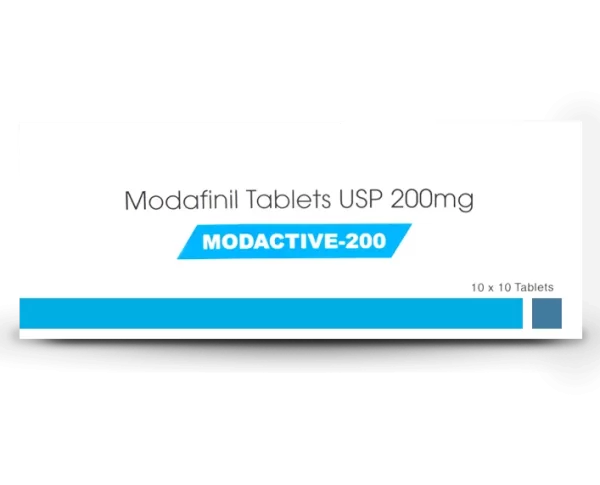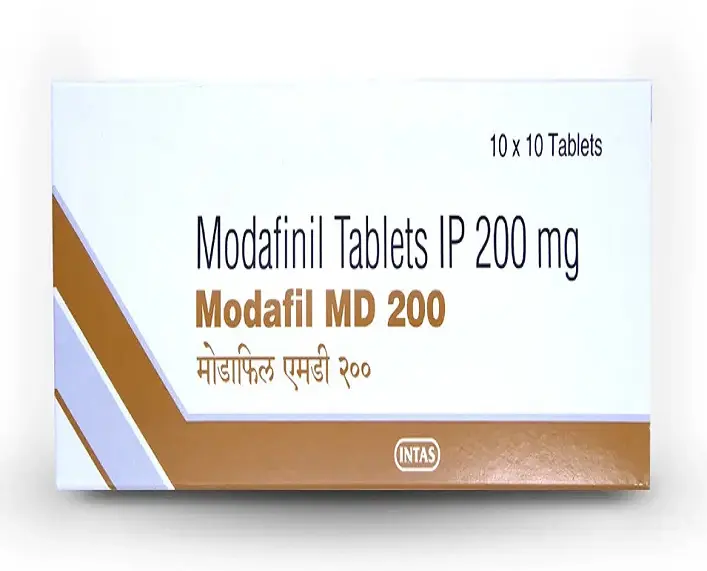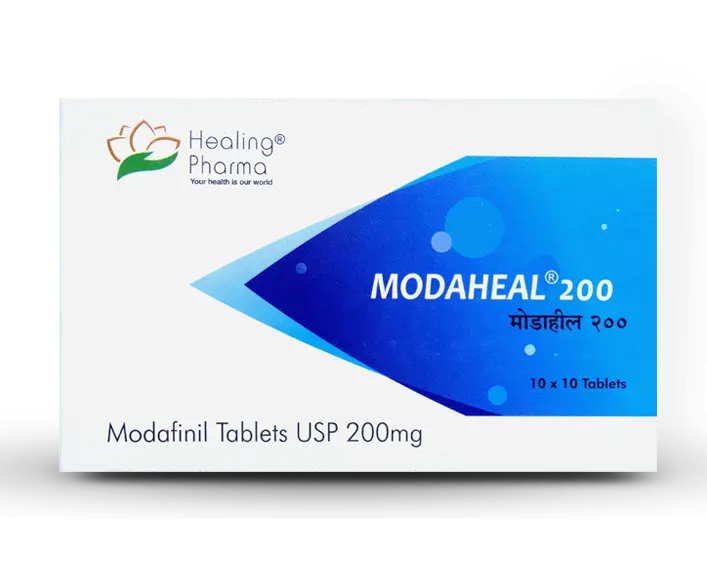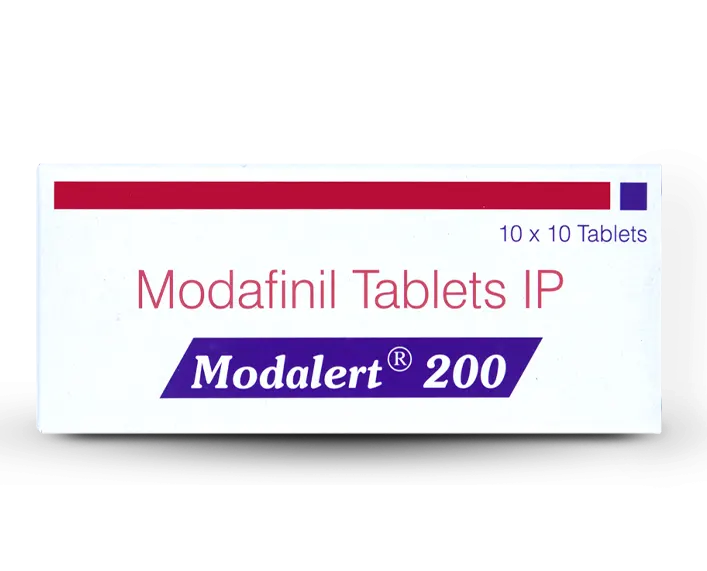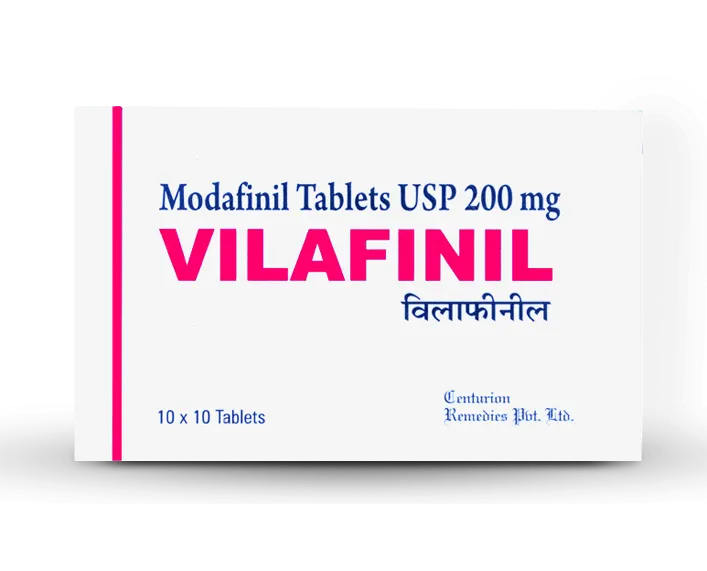What is Modafinil?
Modafinil is a wakefulness enhancing medication used to reduce excessive daytime sleepiness caused by narcolepsy, obstructive sleep apnea and shift-work sleep disorders. It works to keep you awake by changing neural systems in the brain. It works by stopping dopamine from being reabsorbed and raising the amount of dopamine outside of cells.
The precise mechanism of action needs to be better comprehended; however, it is believed to involve the enhancement of hypothalamic and cortical activation. Modafinil can be consumed orally and possesses a lengthy half-life that enables prolonged alertness all day. This medication’s efficiency is attributed to its ability to maintain excitation in the cortex and hypothalamus, thereby reducing the feeling of too much sleepiness during the day.
What are The Uses of Modafinil Tablets?
Modafinil is a wakefulness promoting pill used to keep people awake who are with excessive daytime sleepiness caused by narcolepsy, obstructive sleep apnea & shift-work sleep disorders. It acts by inhibiting the reuptake of dopamine and norepinephrine at the presynaptic cleft.
- Narcolepsy
Patients with this chronic neurological disease, which is characterized by frequent and uncontrollable episodes of extreme daytime sleepiness, are given modafinil to help them wake up more easily.
- Obstructive sleep apnea (OSA)
Modafinil is used as an additional medication to lessen the daytime tiredness that endures even with the best continuous positive airway pressure (CPAP) treatments.
- Shift work sleep disorder (SWSD)
It is suggested for people who have SWSD because it helps them feel less sleepy during the day. This disorder affects people who work odd hours or shifts, which throws off their circadian rhythm.
- Off-label uses
Although it isn’t formally approved, under certain conditions, modafinil can be used off-label for conditions such as attention deficit hyperactivity disorder (ADHD) and cognitive enhancement. These uses should be done carefully, though, and under medical supervision.
What are The Dosage Guidelines for Modafinil Tablets
- Standard Dosage
For people with narcolepsy or obstructive sleep apnea, the first dose of Modafinil is usually 200 mg per day, taken in the morning.
- Highest Dosage
The most common daily rate of Modafinil that is usually advised is 400 mg which can be offered at different times depending on how an individual reacts or tolerates it.
How to Take Modafinil Tablets?
- Morning Management
Use Modafinil in the early hours to stop it from disrupting your nighttime slumber if given for daytime drowsiness.
- Should modafinil be taken with or without food?
Although food can delay the beginning of its effect, this drug can be taken together with meals.
Missed Dosage Guidelines:
If you forget one dose of the medication, take it when you remember, unless it is close to your next dose.
If you miss a dose, do not take two doses at the same time because it can affect your health more.
Overdosage Guidelines:
Go to the hospital or call an ambulance right away if someone overdoses.
Overdose symptoms can include severe restlessness, confusion, or a fast heart rate that needs medical help right away.
How does A Modafinil Tablet Work?
In the case of modafinil, this integration with various processes allows it to primarily act on the neurotransmitter systems of the central nervous system in order to exert its therapeutic effects.
- Dopamine Reuptake Inhibition
By preventing the reuptake of dopamine, a neurotransmitter that is essential for mood and alertness regulation, modafinil raises extracellular dopamine levels in the brain, especially in the cortical and hypothalamic areas. This action improves both wakefulness and cognitive function.
- Hypothalamic Activation
It facilitates the hypothalamus’s activation, which is a crucial brain area involved in controlling the circadian rhythm. To sustain awakeness and alertness, the medication modifies the hypothalamic histamine and orexin (hypocretin) systems.
- Cortical Activation
Modafinil promotes increased cognitive performance and alertness by activating specific cortical regions of the brain, such as those related to executive processes and attention.
There are also changes in serotonin and norepinephrine levels caused by the drug, but not as significantly as the changes in dopamine levels. These neurotransmitters’ interactions with modafinil may contribute to its ability to promote wakefulness.
Modafinil generally makes you more alert and smarter by affecting dopamine reuptake, hypothalamic activation, and cortical stimulation all at the same time.
What are The Side Effects of Modafinil Tablets?
- Headache
- Nausea
- Dizziness
- Insomnia
- Anxiety
- Dry mouth
- Diarrhea
- Back pain
- Elevated blood pressure
- Palpitations
Precautions and Warnings
- Precautions for Modafinil Tablets
People who have had a myocardial attack, high blood pressure, arrhythmias, or arrhythmias in the past should be closely watched because modafinil could make these conditions worse.
- Psychiatric Disorders
People who have had depression, anxiety, psychosis, or bipolar disorder in the past few years should be closely watched to see if their symptoms come back or get worse. This is because modafinil has been linked to these bad reactions.
- Hepatic Impairment
Patients with hepatic impairment may need to have their dose changed because the drug depends on liver processing and a lower clearance rate could raise the risk of side effects.
- Renal Impairment
Patients with renal impairment should be treated with care, but the exact dose changes have not been figured out yet. To lessen the chance of bad effects, it is suggested that kidney function be checked on a regular basis.
- Abuse and Dependence Risk
Modafinil can be abused and become dependent on, especially in people who have a history of drug abuse. Before starting treatment, prescribers should look at the risk of abuse and keep a close eye on their patients for signs of abuse.
- Effectiveness of Contraceptives
Modafinil may make hormonal contraceptives like birth control pills, patches, and implants less successful. During treatment, other or extra ways of birth control that don’t involve hormones should be suggested.
- Allergic Reactions
Modafinil has been linked to serious skin reactions, such as Stevens-Johnson syndrome. If you get a rash or other signs of intolerance, stop using it right away and see a doctor.
Interaction
- Cardiovascular Comorbidities
Individuals who have had a myocardial attack, hypertension, arrhythmias, or arrhythmias historically need to be monitored closely because modafinil could make these conditions worse.
- Psychiatric Disorders
Those who have had psychiatric illnesses in previous years, like depression, anxiety, psychosis, or bipolar disorder, should be closely monitored to see if their symptoms return or get worse because modafinil has been linked to these adverse reactions.
- Hepatic Impairment
Hepatic impairment sufferers may need to have their dose changed because the drug depends on liver processing and a lower clearance rate could raise the risk of side effects.
- Renal Impairment
Renal impairment patients should be treated with care, but the exact dose changes have not been figured out yet. To lessen the chance of adverse reactions, it is suggested that kidney function be checked regularly.
- Abuse and Dependence Risk
Modafinil can be abused and become dependent on, especially in people who have a history of drug abuse. Before starting treatment, prescribers should look at the risk of abuse and keep a close eye on their patients for signs of abuse.
- Hormonal birth control methods
The use of hormonal birth control pills, patches, and implants may not work as well when taken with modafinil. During treatment, additional or different methods of birth control that do not involve hormones should be suggested.
- Allergic Reactions
Modafinil has been linked to serious skin reactions, such as Stevens-Johnson syndrome. If you get a rash or other signs of intolerance, stop using it right away and see a doctor.
FAQs:
1) When does Modafinil start working?
Modafinil usually takes effect within 30 to 60 minutes of being taken.
2) Can I take Modafinil on an empty stomach?
Modafinil may be ingested with or without anything to eat. Nonetheless, its commencement of activity may take place a little bit longer when it has been consumed with food.
3) Does Modafinil affect heart rate?
Some people may experience a rise in heart rate with modafinil usage. In cases where cardiovascular illnesses are involved, it is preferable that a health practitioner constantly monitor you.
4) Is modafinil addictive?
Modafinil might not be that addictive compared to other types of stimulants; however, it can lead to dependency if misused.
5) Can Modafinil be used for memory enhancement?
In some studies, Modafinil has been suggested to enhance distinctive areas of memory, even if it is not specifically authorized for such use.
Showing all 10 results

